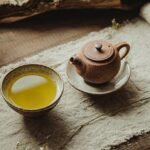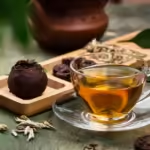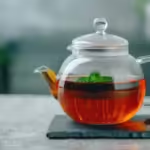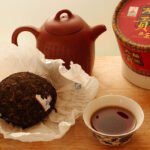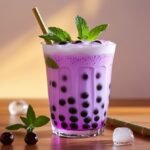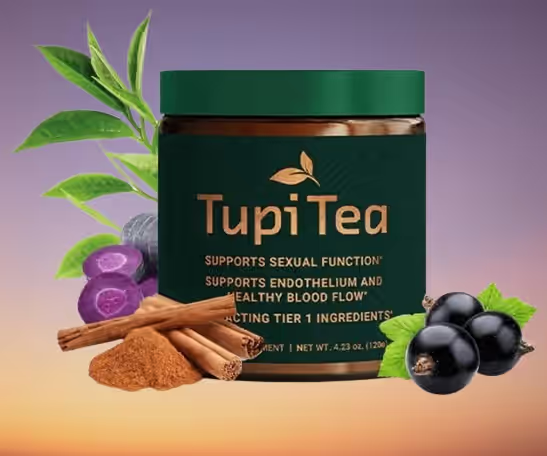Table of Contents
Introduction to Oolong Tea Caffeinated
Oolong tea, a traditional beverage originating from China and Taiwan, occupies a unique position between green and black teas. Unlike green tea, which is unoxidized, and black tea, which undergoes full oxidation, oolong tea is partially oxidized. This partial oxidation results in a diverse flavor profile that varies significantly between different varieties, making oolong a fascinating option for tea enthusiasts.
The origins of oolong tea can be traced back to the Fujian province of China, where it has been cultivated for centuries. The preparation and consumption of oolong tea often involve elaborate cultural rituals, particularly in China and Taiwan. In these regions, oolong tea is not just a drink but a symbol of heritage and social connection. Its flavors can range from floral and fruity to buttery and smooth, influenced by the oxidation process and growing conditions, such as elevation and climate.
The meticulous processing of oolong tea includes steps like wilting, bruising, and carefully controlling oxidation levels. These processes yield a tea with a wide array of characteristics, making it a favorite among both casual drinkers and connoisseurs. Oolong tea is celebrated not only for its taste but also for its cultural significance, reflecting the artistry involved in its cultivation and preparation.
Caffeine Content in Oolong Tea Caffeinated
Oolong tea caffeinated typically contains moderate levels of caffeine, positioning it between green and black teas in terms of caffeine content. An average 8-ounce cup of oolong tea caffeinated provides approximately 30 to 50 milligrams of caffeine. In comparison, black tea usually contains around 40 to 70 milligrams, while coffee often exceeds 95 milligrams per serving.
Several factors influence the caffeine content in oolong tea, including brewing time, the quality of the tea leaves, and processing methods. Generally, a longer steeping time leads to higher caffeine extraction. Higher-quality tea leaves, which are often more mature, may contain more caffeine due to their richness in essential compounds. Understanding these variables allows consumers to tailor their oolong tea experience based on their individual caffeine preferences.

The unique processing methods associated with oolong tea contribute to its balanced caffeine release. Unlike the more immediate caffeine surge often associated with black tea or coffee, oolong tea tends to provide a more gradual energy boost. This can make it an appealing option for those seeking a gentler stimulant throughout their day.
👉 Discover the Bold Elegance of Premium Oolong Tea! 👈
Health Benefits of Caffeine in Oolong Tea Caffeinated
Caffeine, a naturally occurring stimulant found in oolong tea, can offer numerous health benefits when consumed in moderation. One of the primary advantages is its ability to increase energy levels and enhance cognitive function. Studies suggest that moderate caffeine intake can boost alertness, improve concentration, and even enhance mood, making oolong tea a great choice for those in need of a mental pick-me-up.
Beyond its cognitive benefits, caffeine from oolong tea may support weight management. Research indicates that caffeine can boost metabolic rates, leading to more calories burned even at rest. Additionally, the antioxidants present in oolong tea may work in tandem with caffeine to help regulate fat oxidation, potentially assisting in weight loss strategies.
Furthermore, caffeine can play a significant role in physical performance. Regular consumption of caffeinated beverages, including oolong tea, has been linked to improved endurance and a reduced perception of effort during workouts. This makes oolong tea a popular choice among athletes and fitness enthusiasts who seek to enhance their performance while enjoying a flavorful beverage.
While oolong tea’s caffeine content can provide various benefits, it is crucial to consume it mindfully. Excessive caffeine intake can lead to side effects such as jitteriness, insomnia, and elevated heart rates. Therefore, enjoying oolong tea in moderation allows individuals to reap the benefits of its caffeine content without negative repercussions.

Who Should or Shouldn’t Drink Oolong Tea Caffeinated
Caffeine affects individuals differently, and certain demographic groups should consider limiting or avoiding caffeinated oolong tea caffeinated. Pregnant women, for example, are often advised to reduce their caffeine intake to minimize potential complications. The consensus is to keep caffeine consumption within safe limits during pregnancy to protect both the mother and the developing fetus.
Additionally, individuals sensitive to caffeine may experience adverse effects such as anxiety, insomnia, or heart palpitations after consuming caffeinated beverages. For these individuals, drinking caffeinated oolong tea might exacerbate their symptoms, prompting a need for caution or the choice of decaffeinated alternatives.
Those with specific health conditions, such as hypertension or gastrointestinal disorders, should also consult healthcare professionals regarding their caffeine consumption. Understanding personal caffeine tolerance is vital for anyone looking to enjoy oolong tea while maintaining their health.
For those who wish to savor oolong tea without the stimulating effects of caffeine, herbal teas or decaffeinated options provide flavorful alternatives. These choices allow tea lovers to indulge in their rituals without concerns about caffeine intake, ensuring that everyone can find a suitable beverage to suit their preferences.
👉 Smooth, Aromatic, and Powerful – Try Oolong Now! 👈
Decaffeinated Oolong Tea Options
For individuals who want to enjoy the flavors of oolong tea without caffeine, decaffeinated oolong tea offers an excellent alternative. Several methods exist to remove caffeine from tea, including carbon dioxide extraction, water extraction, and ethyl acetate processing.
Carbon dioxide extraction is considered one of the most effective and environmentally friendly methods. It uses pressurized carbon dioxide to selectively remove caffeine molecules while preserving the tea’s delicate flavor profile. As a result, decaffeinated oolong tea can maintain much of its original taste, although some subtle variations may occur.
Water extraction, while more traditional, is less efficient and can dilute some flavor compounds, potentially altering the tea’s character. The ethyl acetate method, using a natural solvent, is popular but may lead to a more noticeable loss of volatile compounds, affecting both aroma and taste.
Decaffeinated oolong tea retains many of the original flavors, but it may lack some of the depth and richness found in caffeinated varieties. Nevertheless, it remains a wise choice for those seeking the health attributes of oolong tea without the stimulating effects of caffeine.
Conclusion
In summary, oolong tea caffeinated is a remarkable beverage that stands out for its moderate caffeine content and significant health benefits. Positioned between green and black tea, it provides a gentle energy boost, making it an ideal choice for those looking for a balance between stimulation and calm.
Beyond its caffeine profile, oolong tea caffeinated is celebrated for its potential health benefits, including improved mental alertness, support for weight management, and enhanced physical performance. These factors make it a versatile beverage enjoyed by a wide range of individuals.
As you explore different types of tea, consider adding oolong tea to your repertoire. Its distinctive flavors and aromas can provide a delightful sensory experience while contributing positively to your overall well-being. Whether enjoyed in the morning as a gentle pick-me-up or in the afternoon as part of a relaxing ritual, oolong tea offers a unique and rewarding experience. By making informed choices about your beverage consumption, you can enjoy the flavorful aspects of oolong tea while also benefiting from its holistic health advantages.



